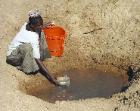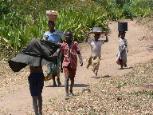

Water and Poverty
A Village's Water Source
A girl collecting water in
Mwamanongu Village, Tazania.
It's estimated that only 46% of
Africans can access clean
drinking water.
Click Here for image source. Image is
in the public domain.
A girl collecting water in
Mwamanongu Village, Tazania.
It's estimated that only 46% of
Africans can access clean
drinking water.
Click Here for image source. Image is
in the public domain.
Hauling Water
Malawians carrying water.
People in Malawi are faced with
droughts, among other things.
Click Here for image source. Image is
licensed under the Creative
Commons Attribution ShareAlike 2.0
Malawians carrying water.
People in Malawi are faced with
droughts, among other things.
Click Here for image source. Image is
licensed under the Creative
Commons Attribution ShareAlike 2.0
| Portal | Home | Information | QuickFacts | Links | Privacy © 2008-2010 H2O - CONTACT WEBMASTER REGARDING THIS SITE |
^Back to Main Information Page
Unfortunately, there are many people throughout the world without a
sufficient supply of fresh drinking water (you can learn more about "the
water crisis" here). In some communities you would have to walk miles
just to fetch dirty water from a river or well.
In India, children - usually girls - are forced to miss school because
they need to stand in line waiting for water to arrive. Many schools also
don't have clean water, and even more go without tap-water or any
other water source.
There are many areas where water is very rare. Sometimes only
wealthy people have access to water. There's even some places where
water has been such a rare resource that there have been wars and
battles over it. Kenyan tribes fought battles over water in February 2006
and in July 2005 thirty-eight people and twenty-two children were
killed in the village of Turbi due to rivalries between tribes. In Yemen,
the villages of Al-Marzuh and neighbouring Quradah fought in a
dispute that involved over seven hundred soldiers, killing six people
and injuring sixty, over a local spring.
However, there are things being done. Numerous charities make
efforts to improve life and provide food and water throughout the world,
What can you do?
A large organization which frequently sends volunteers to African
Villages started off as a high-school club. You are definitely not
obliged to do something like that - but even small things such as
conserving water at home (turning off taps, not wasting water, etc.) can
help. If you want to do something bigger, make a plan and have a
goal. Try to predict what you'll do and how you'll do it. You can read a
great article on goal-setting here. For example, in the far future H2O
hopes to be a charity site to provide clean tap water to schools.
Please visit the links page for a list of websites where you can find
more information about water poverty and other subjects.
Unfortunately, there are many people throughout the world without a
sufficient supply of fresh drinking water (you can learn more about "the
water crisis" here). In some communities you would have to walk miles
just to fetch dirty water from a river or well.
In India, children - usually girls - are forced to miss school because
they need to stand in line waiting for water to arrive. Many schools also
don't have clean water, and even more go without tap-water or any
other water source.
There are many areas where water is very rare. Sometimes only
wealthy people have access to water. There's even some places where
water has been such a rare resource that there have been wars and
battles over it. Kenyan tribes fought battles over water in February 2006
and in July 2005 thirty-eight people and twenty-two children were
killed in the village of Turbi due to rivalries between tribes. In Yemen,
the villages of Al-Marzuh and neighbouring Quradah fought in a
dispute that involved over seven hundred soldiers, killing six people
and injuring sixty, over a local spring.
However, there are things being done. Numerous charities make
efforts to improve life and provide food and water throughout the world,
What can you do?
A large organization which frequently sends volunteers to African
Villages started off as a high-school club. You are definitely not
obliged to do something like that - but even small things such as
conserving water at home (turning off taps, not wasting water, etc.) can
help. If you want to do something bigger, make a plan and have a
goal. Try to predict what you'll do and how you'll do it. You can read a
great article on goal-setting here. For example, in the far future H2O
hopes to be a charity site to provide clean tap water to schools.
Please visit the links page for a list of websites where you can find
more information about water poverty and other subjects.


